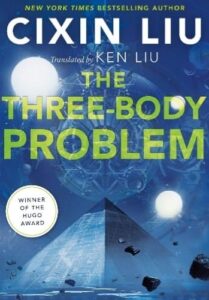A BOOK REVIEW BY SOHAM GUHA
This world has received your message.
I am a pacifist of this world. It is the luck of your civilization that I am the first to receive your message. I am warning you: Do not answer! Do not answer!! Do not answer!!!
There are tens of millions of stars in your direction. As long as you do not answer, this world will not be able to ascertain the source of your transmission.
But if you do answer, the source will be located right away. Your planet will be invaded. Your world will be conquered!
Do not answer! Do not answer!! Do not answer!!!
We had grown up with the works of Arthur C. Clarke, Isaac Asimov, Robert Heinlein and many more maestros of Western science fictions. We grew up with tales that portrayed our generation and those who will inherit the world after us, as explorers of brave new worlds. God, we were so optimistic back then. We thought, we were destined for greatness, achievers of impossible things, and creators of ungodly machines.
What has changed?
Time. And our perception of the grander truth — Of ourselves, our world, and our cosmos.
We are living in a world that is scarred by anthropogenic effects, manifested as pollution and overexploitation of resources. We see the future now too, but we do not see as many bright stars as we did back some decades ago. We see a Dark Forest.
The book in review, called The Three Body Problem can be considered the metaphoric shepherd of today’s world. It is the embodiment of true human nature, that we are capable of many things: most of them unequally destructive with irrevocable ramifications. In the wake of the cultural revolution in China, one engineer working in a radio observatory, sent a message to the cosmos, full of hopelessness, as a prisoner of despotism. She considered her nation a megalomanic narcissistic machine of bureaucracy. She witnessed that machine butcher her father before her eyes. Like many, dealing with insurmountable trauma, she only wanted to see the world burn.
She asked in that broadcast, urging, if something… or someone was out there to reshuffle the pecking order of the human world.
Something answered. Something that still believed in pacifism like our preceding generation.
That is where this novel by Liu Cixin truly shines, as an understanding literature of speculative human history. It revolves around the paramount question that catechises the probability of existence. It asks: What is out there? Who is out there? It tries to find the answer to the Fermi Paradox.
First contact and an alien invasion has been tried and tested since Wells wrote War of The Worlds or The Day Earth Stood Still debuted on the big screen. In modern-age Science Fictions, such things have become a cliché trope. Yet, when Liu presented the idea of an alien invasion, it was presented in a hitherto unheard-of way.
The Three Body explores the nature of men against calamity and how indifferent are our reactions towards such cataclysm, and how fervent are we to fulfil our selfish needs. We act as pioneering prisoners of entropy, wage war on ‘trivial’ things, while the universe watches, and never acquaints us that we are being watched. Humanity is a child, busy with her playthings while the house is burning down.
Liu Cixin presents advanced science and blends them with impossible speculative elements so masterfully that impossible things appear plausible. Yet, in this regard, the weakness of the novel comes out. As an engineer, Cixin had devoted his attention to the believability index of the physics in the prose. However, it appears jarring to as how a completely different culture was able to comprehend human language. Why was not their grammar so different from ours? What had been the intermediary intercommunicating medium? Sadly, the novel poses no answer.
Liu takes Newton’s N-body problem and applies it – spoilers – to the narrative of a VR game. He takes the problems in the standard model of particle physics and applies them to unfold a proton to create a spying supercomputer. Biggest of all, through this novel and its two successors, Dark Forest, and Death’s End, which I will be reviewing later, he tries to answer the Fermi Paradox.
Like all of us looking at the night sky he had asked, why is it so quiet out there?
And the answer came: the Cosmos is a hunting ground.
Because my introduction to science fiction was through the works of Clarke and Asimov, I immensely liked this novel, despite this being the weakest of the trilogy.
And the ending made it feel like a prologue to the Dark Forest. The lines quoted at the beginning, actually spoil the suspense a bit for me. And there is where the novel diverges from the rest of the optimistic first contact novels I have read and we all grew up with.
Mankind will not be victorious. There is a sheer possibility that we will suffer a devastating defeat if something from the stars visits us.
Suppose you, yes you, received this message. What will you do?
You will cower and pretend this cosmic mail never arrived; you will imagine all this was a fever dream. But what did this operator do?
She responded: Come here! I will help you conquer this world. Our civilization is no longer capable of solving its own problems. We need your force to intervene.
This sense of hopelessness, disturbing exclusionism, and even pessimistic futurism, is something seldom seen in Western Literature. And it is present in the entire trilogy. Liu Cixin has woven the narrative through the eyes of persons at the edge. And because of all these, because of the author’s cultural upbringing, though the characters may feel animate, they are not underdeveloped.
The author puts organizations over characters, and ideas before dialogues.
The Three Body Problem, in its first chapter, strangely, does not feel like a science fiction novel, but rather literary fiction. And that sense is carried on over the entire narrative. The author never presents any fantastical settings, or any dazzling battle in space. He presents guerrilla cyberwarfare, the tenuous working mechanics of governments, swift and slithery maneuvers of extremist organizations, cultural rigidity, and denial dynamics: each a dimension of our pluralistic world.
The novel works as a manifold narrative, tackling two temporal and one virtual front. On one side, physicists are committing suicide across the globe for unfathomable reasons. One promising name from China, Yong Dong, left a strange suicide note, declaring Physics is non-existent. On the other side, Wang Miao, an investigating officer stumbled upon a VR game named THREE BODY while analyzing the cause of the death of Yong Dong. He finds himself on a barren, simulated landscape where historical figures across time are trying to understand the mystery of the extreme seasonal cycles of the land and how it relates to the three wandering stars at the horizon. Amidst all this, the author takes the readers through the history of a speculative modern China that wears trench coats of totalitarianism.
Wang logs into Three Body and struggles to establish his avatar of a VR game that tells the history of an impossible planet through the men and women of Terran History. Outside, behind the real sky, the cosmic background radiation flickers. The ancient hymn of the universe is being subtly altered, unnoticed, and unrecognized by humanity.
Inside the simulation, that impossible planet moves in a twisted orbit around three stars. The inhabitants of such a hellish, hostile place, our aliens, the Trisolarians are our cosmic neighbour from the system of the century sisters. And they found us because we wanted them to find us.
Like all opportunistic and sentient apex predators, they had modified a proton to be a supercomputer, annihilating everything in that subatomic hyper-compactified microcosmos. These supercomputers, or Sophons, deliberately puts the advancement of physics to a halt, and human civilization, and our secrets become transparent as glass.
Something they deemed was of absolute necessity. Why?
Because of the distance of this baleful cosmos. Unfathomable until you breach the speed limit of light like Barry Allen, or bypass like Night flyers and USS Enterprise.
It will take time for the exoplanetary visitors to reach our temperate, generous world. The Sophons are here to ensure we do not rapidly advance in anything. Given our explosive trajectory as a species, in time, we would become a worthy opponent, even superiors, making our lush world unfit for colonization. The Three Body Problem, at its core, is the reaction of humanity towards such a crisis. And we have already seen how deep we can plunge before a crisis as novel as this, like the pandemic.
The bleakness of the narrative is because of the concreted certainty of the future. That we will lose. There is no Mobius strip-based time heist, no plutonium-powered DeLorean. No REDO. Just the road to time like infinity.
It defines who we truly are and what we can potentially become.
Also, read The Goblin That Kidnapped The Kittens by Violet, translated from The Tamil by D. S. Vincent, and published in The Antonym:
Follow The Antonym’s Facebook page and Instagram account for more content and exciting updates.



























Good review, great book